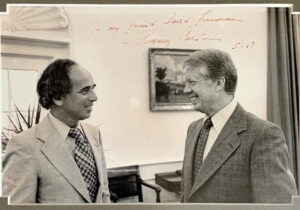 ”
”
JIMMY CARTER: Nuke Watchdog Commemorations
January 2, 2025
https://beyondnuclear.org/jimmy-carter-1924-2024-nuke-watchdog-commemorations/
[White House Oval Office photograph, signed by President Carter (October 1, 1924 — December 29, 2024), showing him with S. David Freeman (January 14, 1926 – May 12, 2020). Thank you to Glenn Carroll, Nuclear Watch South coordinator, for sharing the photo.]
Given his very extensive involvement in key nuclear issues, president Jimmy Carter’s death, at age 100, on December 29, 2024, elicited response from nuclear watchdogs.
Tom Clements, Savannah River Site (SRS) Watch director, published a tribute: “Thank you, Jimmy Carter, for your monumental environmental and non-proliferation decision in 1977! South Carolina and the nation owe you a debt of gratitude.”
Clements focused on Carter’s decision to halt commercial reprocessing in the U.S., which led to the cancellation of the Barnwell, South Carolina reprocessing facility near the border with Georgia, in the same town as a leaking “low-level” radioactive waste dump “serving” several dozen states for decades on end. Rural Barnwell, South Carolina is majority African American, with low-income challenges. It is also the birthplace of musician James Brown. It is nearby not only the SRS nuclear weapons complex, but also the Vogtle nuclear power plant on the Georgia side of the Savannah River, the largest in the country by both number of reactors (four), as well as nuclear mega-wattage-electric (more than 4,000).
Bob Alvarez of Institute for Policy Studies (IPS), former senior advisor to the Energy Secretary during the Clinton administration, added that “Carter, as Governor of [Georgia], stopped the [Atomic Energy Commission] plan to dig a 15-foot diameter shaft and dispose of 80 million gallons of high-level radioactive wastes at the Savannah River Plant beneath the region’s primary ground water supply.”
Glenn Carroll, Nuclear Watch South coordinator, celebrated Carter’s appointment of Tennessee Valley Authority chair S. David Freeman (pictured above, with the president in the Oval Office), who cancelled nine proposed atomic reactors.
As Carroll pointed out, “Jimmy Carter’s stand against [commercial] reprocessing not only halted the U.S. reprocessing endeavor but largely chilled the technology globally.”
This came at a crucial time. Argentina and Brazil, as well as South Korea and Taiwan, followed Carter’s lead and banned commercial radioactive waste reprocessing. Each country was a military dictatorship at the time, embroiled in cross-border tensions with their geopolitical neighbors, and were flirting with the idea of becoming nuclear weapons powers. Commercial irradiated nuclear fuel reprocessing would have provided them with a pathway to obtaining weapons-usable Plutonium-239.
In 1974, India followed just such a pathway to nuclear weapons status, using a Canadian CANDU research reactor, and U.S. reprocessing technology. This sparked a nuclear arms race with rival Pakistan.
As previously mentioned above, Carroll also shared that:
“Dave Freeman and Arjun Makhijani’s Time to Choose report on renewable energy inspired Carter to appoint Dave to the TVA board where Dave distinguished himself by cancelling nine reactors on order and launched a public power career in which he saw goals of the [1974] report becoming real. Despite nuclear industry hype we see the present day colossal success of wind and solar energy as nuclear continues to lose momentum.”
Freeman, nicknamed “The Green Cowboy,” headed up the Ford Foundation’s Energy Policy Project in the early 1970s. Freeman hired Makhijani to co-author the A Time to Choose: America’s Energy Future report.
— see full post at link above
South Carolina Chapter of the Sierra Club on “President Carter’s Enduring Legacy on Climate Action,” January 9, 2025: https://www.sierraclub.org/south-carolina/president-carter-s-enduring-legacy-climate-action